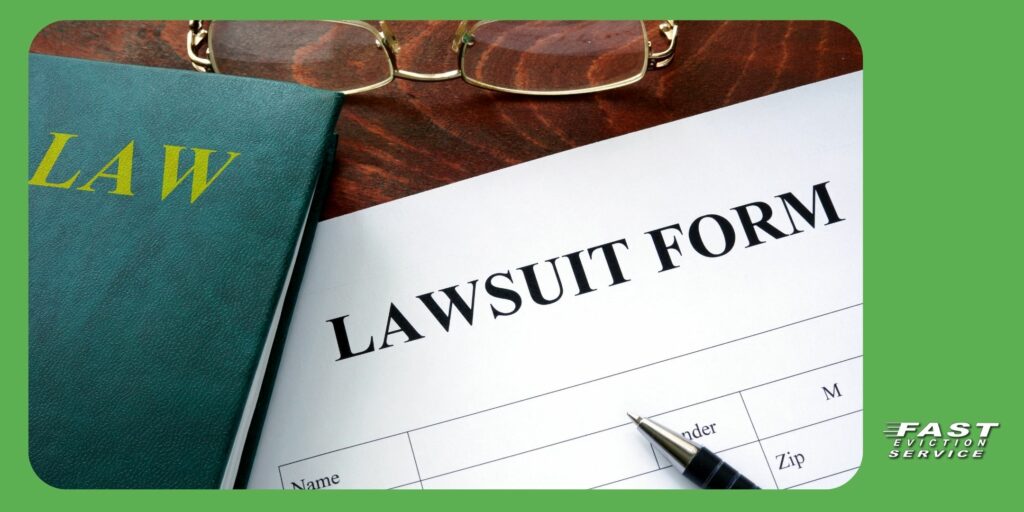You are represented at all times by one of our California Eviction Attorneys | 1-800-686-8686 | intake@fastevict.com | Se habla español
How to Protect Your Rental Properties From Lawsuits and Creditors
Updated 06/11/25
As a landlord, you worked hard to build your rental portfolio. Whether you started with a single-family home or scaled up to multiple multifamily properties, your real estate assets represent years of investment and planning. But one unexpected lawsuit, creditor claim, or accident can put it all at risk. Learning how to protect rental property from lawsuits isn’t just smart—it’s essential for long-term success.

Understanding legal protection strategies isn’t just for the ultra-wealthy or mega-landlords. Every property owner, no matter how big or small their portfolio, should have an asset protection plan. Landlord asset protection strategies can help you shield your properties, limit personal exposure, and preserve your financial future.
Too Long Didn’t Read:
If you’re a landlord, protecting your rental property from lawsuits and creditors is a critical step. This article walks through real estate asset protection strategies like LLCs, trusts, umbrella insurance, and more. Learn how to reduce risk, safeguard your equity, and structure your business to limit liability.
Table of Contents
- Why Real Estate Asset Protection Matters for Landlords
- Understanding the Risks: How a Lawsuit Can Affect Your Rental Portfolio
- Top 6 Real Estate Asset Protection Strategies
- What Is the Role of Landlord Insurance in Asset Protection?
- Using LLCs to Limit Liability and Isolate Risk
- How Trusts Add Privacy and Legal Safeguards
- Avoiding Risk Through Better Screening and Contractor Vetting
- How Equity Stripping Shields Your Rental Property
- The Homestead Exemption: What It Is and Who Qualifies
- Are Nevada and Wyoming Really Better for LLCs?
- Asset Protection vs. Asset Preservation: What’s the Difference?
- When to Talk to a Legal or Financial Advisor About Protection Plans
- Frequently Asked Questions
Why Real Estate Asset Protection Matters for Landlords
Real estate lawsuits are more common than most landlords realize. A tenant could slip and fall on icy stairs. A contractor could sue you for an unpaid invoice. A disgruntled neighbor might file a nuisance claim. Without the right structure and coverage, your personal assets—including your home and savings—could be on the line.
This is why understanding how to protect rental property from lawsuits is critical. Asset protection helps ensure that your liability stops at the property level. That means even if something goes wrong, you won’t lose everything you’ve worked for.
Understanding the Risks: How a Lawsuit Can Affect Your Rental Portfolio
A single lawsuit can unravel years of investment gains. Let’s say a tenant sues after an injury on your property. If you own the property in your personal name, your bank accounts, vehicles, and even other rental properties could be targeted. Even worse, a large judgment could lead to wage garnishment or a lien on your home.
Landlord liability protection isn’t about hiding assets. It’s about organizing your real estate investments to reduce exposure. The more you isolate risk and insure against common claims, the more resilient your business becomes.
Top 6 Real Estate Asset Protection Strategies
When landlords ask how to protect rental property from lawsuits, there are six primary strategies to consider: forming an LLC, obtaining umbrella insurance, creating land trusts, stripping equity, using the homestead exemption, and proper tenant screening. Each of these methods works differently, but together they provide a layered approach.
The goal is not just legal protection for real estate investors—it’s building a long-term shield that makes lawsuits less likely and less costly. Real estate risk management for landlords isn’t about eliminating all risk; it’s about being prepared.
What Is the Role of Landlord Insurance in Asset Protection?
Landlord insurance provides critical coverage for property damage, loss of rent, and liability claims. It’s your first line of defense when things go wrong. But not all policies are created equal. You should verify that your policy covers injuries to guests, legal defense costs, and property damage beyond normal wear and tear.
Beyond standard insurance, consider an umbrella insurance policy for landlords. Umbrella insurance adds an extra $1 million (or more) in coverage above your existing policies. It’s a smart, affordable way to add another layer of protection.
Using LLCs to Limit Liability and Isolate Risk
Creating an LLC for each rental property can help limit liability and isolate risk. If someone sues over a slip-and-fall at Property A, your other properties and personal savings stay safe. This is one of the most recommended landlord asset protection strategies.
Setting up an LLC isn’t overly expensive, and states like Delaware, Nevada, and Wyoming offer landlord-friendly privacy protections. Just remember to keep your business and personal finances separate and maintain good records. That’s what keeps the corporate veil intact.
How Trusts Add Privacy and Legal Safeguards
Trusts offer another way to protect real estate from creditors. A land trust can hold title to the property, making it harder for potential litigants to identify you as the owner. This adds a layer of privacy and makes you less of a target.
When comparing a trust vs LLC for real estate, keep in mind that LLCs offer liability protection, while trusts focus more on anonymity and estate planning. Using both together can offer maximum protection.
Avoiding Risk Through Better Screening and Contractor Vetting
Some lawsuits come from simple mistakes. A bad tenant damages your property. An unlicensed contractor gets injured. You can reduce your exposure by improving your tenant screening process and always verifying contractor insurance and licensing.
Screen for credit history, background checks, income, and rental references. This reduces the chance of lease violations, damage, or non-payment. When hiring contractors, confirm worker’s comp coverage and business insurance. Prevention is often the best protection.
How Equity Stripping Shields Your Rental Property
Equity stripping is a strategy that reduces the value available to creditors. For example, you could place a mortgage or line of credit on the property, reducing its net equity. This makes the asset less attractive to someone filing a lawsuit.
Equity stripping real estate isn’t about creating fake debts. It’s a legitimate tool to discourage frivolous lawsuits and shield assets from judgments. Talk to a financial advisor before using this strategy to ensure it’s legal and properly documented.
The Homestead Exemption: What It Is and Who Qualifies
If you live in one of your properties, your state may offer a homestead exemption. This legal provision protects a portion of your home’s value from creditors. For landlords, it often applies only to your primary residence, not rental properties.
Still, it’s worth checking your state’s rules. Homestead exemption for real estate protection varies widely. Some states, like Florida and Texas, offer nearly unlimited protection. Others cap the exemption or require specific filings.
Are Nevada and Wyoming Really Better for LLCs?
Nevada LLCs are often promoted as ideal for asset protection. They offer strong privacy laws, limited disclosure, and no state income tax. Wyoming is similar, with low filing fees and robust asset protection statutes.
But these benefits aren’t always worth the hassle unless you live in those states. Forming a Nevada LLC for asset protection when you live in California, for instance, means you’ll still have to register it in California and follow their laws. Be strategic and talk to an attorney before going out-of-state.
Asset Protection vs. Asset Preservation: What’s the Difference?
Asset protection focuses on shielding your wealth from legal threats. Asset preservation is about maintaining your wealth over time—through tax planning, estate planning, and proper maintenance of your properties.
Both are essential for successful real estate investors. Real estate protection vs preservation is not an either/or decision. They work best together, with the help of legal and financial professionals guiding your strategy.
When to Talk to a Legal or Financial Advisor About Protection Plans
If you’re unsure about any of these strategies, or you own multiple properties, it’s time to consult a professional. An attorney experienced in landlord liability protection or a financial advisor who understands real estate can help you build a solid protection plan.
You don’t need to be a millionaire to need protection. All it takes is one angry tenant or unpaid bill to put your investments at risk. Being proactive is the best way to avoid disaster.
Frequently Asked Questions
How do I protect my rental property from lawsuits?
You can protect rental property from lawsuits by using LLCs, trusts, umbrella insurance, strong lease agreements, and proper screening procedures. Each layer reduces the chances of a successful claim.
Is an LLC or trust better for rental property protection?
LLCs are better for liability protection; trusts offer privacy and estate planning benefits. Using both together is often ideal.
Do I need insurance if I have an LLC?
Yes. Insurance covers many risks that an LLC does not. Umbrella insurance for landlords provides added protection beyond standard policies.
What state is best for forming an LLC for rental property?
States like Nevada and Wyoming offer strong privacy laws and asset protection benefits. But if you operate in another state, you’ll still need to register your LLC there.





